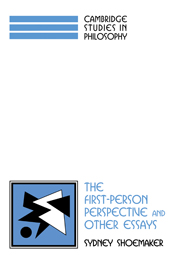Book contents
- Frontmatter
- Contents
- Preface
- Sources
- PART I SELF-KNOWLEDGE
- 1 Introspection and the self
- 2 On knowing one's own mind
- 3 First-person access
- 4 Moore's paradox and self-knowledge
- PART II QUALIA
- PART III MENTAL UNITY AND THE NATURE OF MIND
- PART IV THE ROYCE LECTURES: SELF-KNOWLEDGE AND “INNER SENSE”
- References
- Index
1 - Introspection and the self
Published online by Cambridge University Press: 16 January 2010
- Frontmatter
- Contents
- Preface
- Sources
- PART I SELF-KNOWLEDGE
- 1 Introspection and the self
- 2 On knowing one's own mind
- 3 First-person access
- 4 Moore's paradox and self-knowledge
- PART II QUALIA
- PART III MENTAL UNITY AND THE NATURE OF MIND
- PART IV THE ROYCE LECTURES: SELF-KNOWLEDGE AND “INNER SENSE”
- References
- Index
Summary
Few passages in philosophy are better known than David Hume's denial that there is introspective awareness of a self or mental subject: “For my part, when I enter most intimately into what I call myself, I always stumble on some particular perception or other, of heat or cold, light or shade, love or hatred, pain or pleasure. I never can catch myself at any time without a perception, and never can observe anything but the perception.” Humes denial has been repeated by philosophers as different as Kant and Wittgenstein and has commanded the assent of the majority of subsequent philosophers who have addressed the issue. And it has been widely seen as having important implications concerning the nature of the self and the nature of self-knowledge and self-reference. Some have followed Hume in concluding that a self is “no more than a bundle or collection of different perceptions,” or, in more recent versions of the view, that it is a “logical construction” out of experiences and other mental particulars. Some have taken the Humean denial to support the Lichtenbergian view, which has had the endorsement of Wittgenstein and more recently of Elizabeth Anscombe, that the word “I” does not refer. And many have taken it to undermine Cartesian dualism. A recent expression of this last assessment is Saul Kripke's observation in Naming and Necessity that “Descartes' notion seems to me to have been rendered dubious ever since Hume's critique of a Cartesian self.”
- Type
- Chapter
- Information
- The First-Person Perspective and Other Essays , pp. 3 - 24Publisher: Cambridge University PressPrint publication year: 1996
- 3
- Cited by

